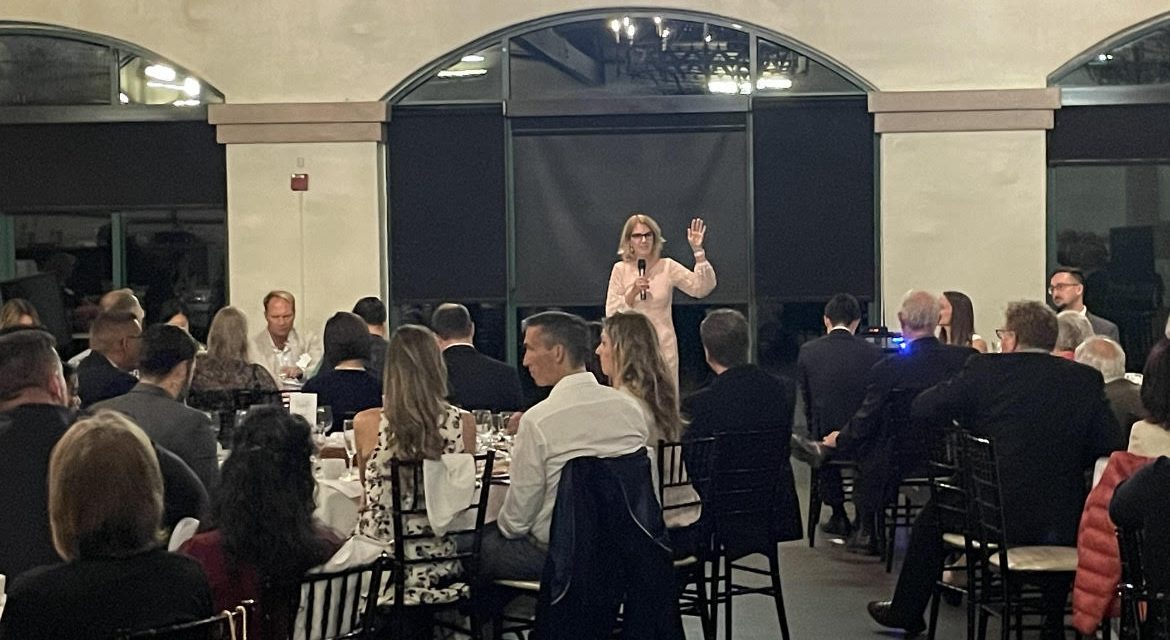CBC President Jennifer Lahl delivered remarks at Paul Ramsey Diner. For those unable to attend you can read her remarks here:
I thought with all the news around “Drag Queen Story Hour” and “book banning” I would couple my remarks this evening with the wholesome and classic children’s story, “The Little Engine that Could”. As a refresher, the story begins with a train carrying toys to deliver to children, but halfway to the top of a great mountain, the train runs out of steam and gives up. Soon another train with a ‘great big engine’ came by and the stalled train asked to be pulled up the mountain, but the big engine couldn’t be bothered because he had better things to do. The toys began to cry because the big engine was so mean but soon came a small train, “the smallest ever seen.” Though it seemed this small train would be of no use, he said, “I think I can, I think I can, I think I have a plan”. And of course, the story ends happily and with great success as the toys are finally delivered to the children. The book ends with “I knew I could.”
For us at the CBC, like the little engine, we are small, and often tell ourselves that ‘we think we can,’ only to realize that we knew we could, but more importantly, we knew we should. We know it is our calling to take on this great mission of advancing science, medicine, and technology, in the cause of first do no harm medicine and promoting the dignity of the human person.
Allow me to highlight a few examples from this past year. One year ago, we released our 10th documentary film, “The Detransition Diaries: Saving our Sisters”, which focused on 3 young women who thought if they could become men, their life would be better. Taking on a new film project is like pushing a train up and over a mountain, I think I can, can often turn into “I hope we don’t crash the train.” Before the film was even released, Ignatius Press offered Kallie and I a book contract, to write the book, The Detransition Diaries. So, in addition to releasing a new film we signed a contract to write a book. And boy did we write. Our editor said she had never received a book manuscript in such a short amount of time!
The Detransition Diaries film has been sold in over 50 countries and is now available to view online for free in 11 different languages. And the book, The Detransition Diaries, has a release date of January 2024. When The Detransition Diaries was released, we figured we could sit on our laurels for a moment and catch our breath, but we had an outpouring of parents reach out to us. They came to us with a plea, please tell the stories of our sons, their young boys, who are getting caught up in the lie that they were born in the wrong body. This past July we went into production on what will be our 11 th documentary film, “The Lost Boys: Searching for Manhood.” We crowd funded our production costs, mainly from donations from these parents and over the summer Kallie and I traveled to Rhode Island, Pennsylvania, Washington, Hollywood, and onto England, conducting a total of 9 interviews, with 5 being young men who have now detransitioned. Currently, we are in script-writing mode, and raising our post-production costs, so pray for us. Another “I think we can moment” happened when Ignatius Press asked us to add two more chapters in the book, which feature young detransitioned men. So, in the midst of flying everywhere this summer, we wrote two more chapters. I must say, the artwork that Ignatius Press has designed for the cover of the book is beautiful – it’s a bowl, my daughter Julia looked at it and immediately said, “oh that is Kintsugi!”
I had to google that to learn that Kintsugi is the Japanese art of putting broken pottery pieces back together with gold, recognizing we are imperfect– and isn’t it just beautiful when you think of these people whose bodies have been broken by physicians who perform transgender surgeries and put young people on harmful hormones. As one young man in our new film says, “we are not victims, we are in recovery.” Why do we make movies? CBC has always sought to engage with and address the most pressing medical ethical issues facing culture today and film is a powerful medium for engagement. Looking forward, it is important to us that we better prepare young scholars for the future. As Prof Meilaeder has said, we seek “to seed the academy” with the best and brightest thinkers. And we are happy to have you join us tonight in celebration of the contribution Professor Gilbert Meilaender has made to the institute over this last decade. Let me say a few things about the Paul Ramsey Institute.
During graduate school my thinking on matters around medical ethics was greatly impacted by the writings of the late great Paul Ramsey. His book, “The Patient as Person”, (required reading for all our fellows) is a timeless exploration in Medical Ethics. Ramsey was prophetic in his 1970 book “Fabricated Man,” as he looked at the field of genetics and more importantly the control of genetics. To that end, we began the annual Paul Ramsey Award dinner in 2004, with the first award going to Dr. Edmund Pellegrino, a force in his own right. Pellegrino was Professor of Medicine and Medical Ethics at Georgetown University. I still recall calling the phone number on the Georgetown University website as I needed to find out how to reach him to let him know he was the recipient of the award. I was pleasantly surprised when Pellegrino answered the phone – he truly was a good old-fashioned old-school doctor! Five years later, Dr. Gilbert Meilaender received this prize, and to date, he is the only recipient of this award who studied at Princeton under Paul Ramsey. Our Ramsey fellows are treated to firsthand accounts and humorous stories of Ramsey. But back to the Little Engine. What is a scrappy organization with bareley 2 and ½ employees, on a shoestring budget doing making movies and launching a 2-year fellowship? Well, we are doing what we think we can do
and what we should do.
Since we launched the fellowship, we have received three prestigious Templeton Grants from the Templeton Religious Trust, and we were just awarded a grant from the Bradley Foundation for a Paul Ramsey Fellow alumni meeting. Not only have we had nearly 50 young men and women go through our fellowship program, but we also see the need to develop a robust alumni network. These fellows hail from places like Yale, Duke, Stanford and are pursuing medical or law degrees or are on an academic PhD tract, and they have a strong desire to remain connected with like-minded people. It’s a cold cruel world out there and we hope to build them up, encourage them, and connect them with lifelong friends and colleagues. With your help and support we will keep doing what often seems impossible. Trust me, we have things to do and a plan to do it, for our shared human future!
Author Profile

- Jennifer Lahl, MA, BSN, RN, is founder and president of The Center for Bioethics and Culture Network. Lahl couples her 25 years of experience as a pediatric critical care nurse, a hospital administrator, and a senior-level nursing manager with a deep passion to speak for those who have no voice. Lahl’s writings have appeared in various publications including Cambridge University Press, the San Francisco Chronicle, the Dallas Morning News, and the American Journal of Bioethics. As a field expert, she is routinely interviewed on radio and television including ABC, CBS, PBS, and NPR. She is also called upon to speak alongside lawmakers and members of the scientific community, even being invited to speak to members of the European Parliament in Brussels to address issues of egg trafficking; she has three times addressed the United Nations during the Commission on the Status of Women on egg and womb trafficking.
Latest entries
 infertilityApril 23, 2024The Rise of International Gestational Surrogacy in the U.S.
infertilityApril 23, 2024The Rise of International Gestational Surrogacy in the U.S. Assisted Reproductive TechnologyApril 16, 2024Founder Jennifer Lahl’s Speech on Surrogacy to the Casablanca Declaration
Assisted Reproductive TechnologyApril 16, 2024Founder Jennifer Lahl’s Speech on Surrogacy to the Casablanca Declaration #BigFertilityFebruary 27, 2024No, Alabama Didn’t Ban IVF
#BigFertilityFebruary 27, 2024No, Alabama Didn’t Ban IVF ArticleSeptember 25, 2023The Little Engine That Could
ArticleSeptember 25, 2023The Little Engine That Could


